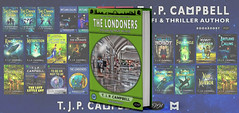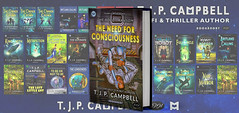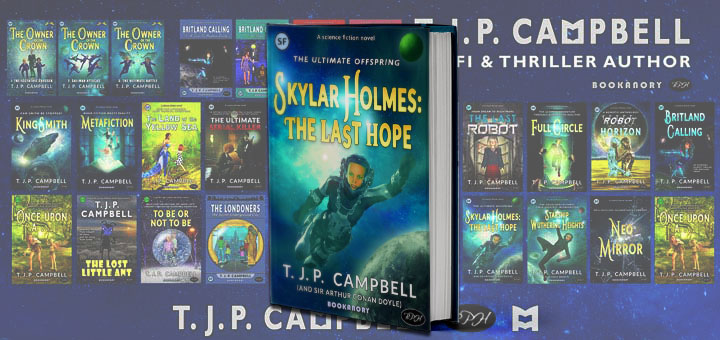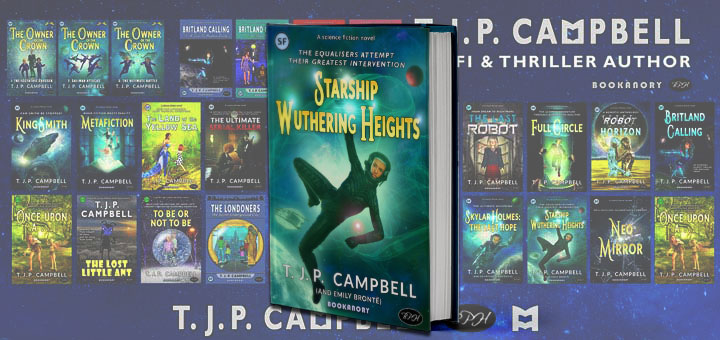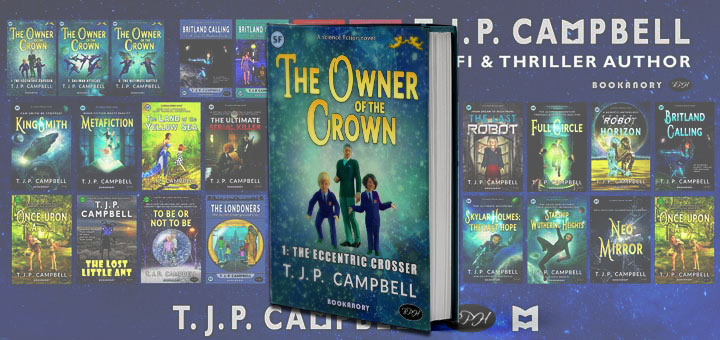Pride and Prejudice and Superheroes – Opening Chapters
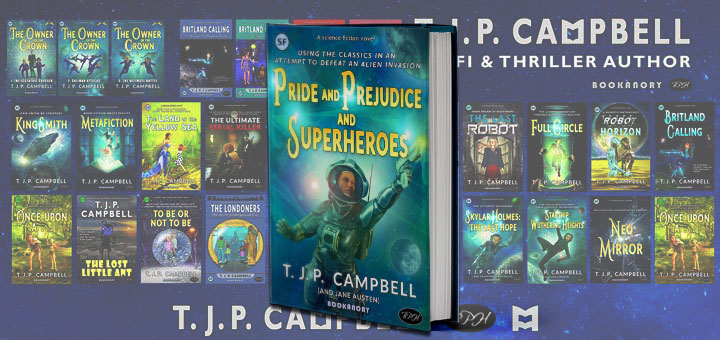
1
PROMETHEUS; OR, THE MODERN SUPERHERO
IT IS A TRUTH universally acknowledged, that a single woman in possession of a free mind, must be in want of a superhero. However little known the feelings or views of such a woman on a superhero first entering her neighbourhood, this truth is so well fixed in the superhero’s mind that the woman is considered the superhero’s rightful property—unless the woman is a superhero herself.
The Bennet family, beneficiaries of the landed gentry of the British Regency, lived in the ample Longbourn House estate in the village of Longbourn in Hertfordshire. It was a busy, if somewhat confusing, family home, with Mr Bennet and his servants keeping a modicum of orderliness over his five multifarious daughters, and over his, according to himself and anyone who knew her behind her fan, silly, narrow-minded and shallow wife. At times, Mr Bennet thought that the perceived mental state of King George III, who all and sundry believed to be permanently insane, had somehow infected his estate. And he understood well that the cost of a marriage could not be measured in purely financial terms, especially as his marriage had conspired not to deliver a son.
If only there had been a son, just a single solitary son, then the Bennets would have been able to inherit the Bennet estate. However, most unfortunate as it is, it is the cousin of Mr Bennet, one Mr William Collins, who stood to inherit the estate on Mr Bennet’s death. To make matters worse, everyone who knew Mr Collins thought him to be an undesirable mixture of pride and obsequiousness, self-importance and humility. As a consequence, he had a different view of himself, thinking he was a quite desirable, noble creature. He had no conception that he was a rather toady, pathetic man whose whole had somehow conspired to be less than the sum of his parts.
And so, in the relative madness of Longbourn House, one dull September day, an interesting event was discussed …
“My dear Mr Bennet,” offered Mrs Bennet to her husband, as she impinged on the privacy of his library, “have you heard that Netherfield Park is let at last?”
“No, my good wife, but I predict with utmost certainty that you are about to inform me of the positive.”
“Yes, my dear, you predict correctly. For Mrs Long has just occasioned a visit here, and she has told me all about it.”
Mr Bennet made no answer as he slowly and leisurely turned a page of a rather thick tome.
“Don’t you want to know who has taken it?” cried Mrs Bennet impatiently, punctuating her impatience with a small childlike but graceful leap. Her husband must surely have seen this trivial action in his peripheral vision, designed, as it must have been, to gain his attention.
“You want to tell me, and I have no objection to hearing it,” said Mr Bennet, lifting a magnifying glass and peering intensely at an illustration of an exotic plant.
For Mrs Bennet, her husband had left the door to conversation ajar, and she was more than ready and willing to plough through it.
“Why, my dear, you must know, Mrs Long says that Netherfield is taken by a young man of large fortune from the north of England. That he came down on Monday in a chaise and four to see the place. He was so much delighted with it he agreed on a tenancy agreement with Mr Morris immediately. He is all set to take possession before Michaelmas. Most decidedly, some of his servants will be readying the house as early as by the end of next week.”
Mr Bennet sighed. It was obvious to him why his wife was so inclined and enthusiastic to discuss such news with him. He did his wife the courtesy of looking up from his book. However, when his eyes met hers, he could not but help rolling them sarcastically.
“Let us cut to the chase, good wife. What is his name?”
“Charles Bingley.”
Mr Bennet’s eyes took on a deepening, cynical look. His eyebrows tugged to a mild frown. “Is this young buck, this tip-top toff, married or single?”
Mrs Bennet’s eyes widened, and she jerked her head as if the manner of delivery of her husband’s question had unbalanced her. But this lady was not for being unbalanced during, at least to her, such an important conversation. “He is single, my dear, to be sure! Oh, my dearest dear, do consider the gravity of such a serendipitous event. A single man of large fortune. It is said, four or five thousand a year! Thus, what a fine thing for our eligible handsome girls!”
“How so? How can it affect them?” Mr Bennet’s grin gave away the fact that his questions were merely rhetorical. At least he thought so. But his game was: would his wife reach the same conclusion.
“My dear Mr Bennet,” replied his wife, “how can you be so tiresome? You must know that I am thinking of his marrying one of them.”
“Must I?”
“You must!”
“Wife, you deliver a veritable militia of exclamatory rhetoric. Does each sentence you utter need to end in a sign of exclamation?”
“You are no better,” retorted Mrs Bennet. “Your sentences end in question marks with unceasing repetition.”
“Touché, my dear. And not being one to disappoint, let me continue with my questions. Is marrying one of our girls Mr Bingley’s design in settling here? After all, is it not a truth universally acknowledged, that a single man in possession of a good fortune, must be in want of a wife?”
“Design! Such slum! How can you talk so! Do not try to befog me. For most surely, is it not very likely that he may fall in love with one of them? And we do have five to choose from. What man can resist at least one fine diamond in the first water when offered a handful? So, my dear, I put it to you, that you must go to him as soon as he comes.”
“I see no occasion for that. For you know nothing of the feelings or views of Mr Bingley. So what right do you have to consider him the rightful property of one of our daughters? You and the girls may go, or you may send them by themselves. Hmm, perhaps the former will be better, for as you are as handsome as any of them, Mr Bingley might like you the best of the party.”
“My dear, are you insulting or flattering me? I certainly still have my share of beauty, but I do not pretend to be anything extraordinary now. When a woman has five grown-up daughters, she ought to give up thinking of her own beauty.”
“Indubitably so. But in such cases, a woman has not often much beauty to think of. Every norm has its exception. And in this, you are an exception. I did not so readily and prematurely marry you solely for your intellectual conversation.”
Mrs Bennet hesitated, as if wondering, not for the first time, whether or not her husband had just paid her a compliment. But her enemy Mr Time waits for no woman. So she said with a great sense of urgency, “But, my dear, you must indeed visit Mr Bingley when he arrives at the neighbourhood.”
“It is more than I engage for, I assure you.” Mr Bennet took once more to scrutinising his scholarly tome.
“But consider your daughters,” said Mrs Bennet in cloying, pleading tones. “Only think what an establishment it would be for one of them. Sir William and Lady Lucas have determined to go, merely on that account; for in general, you know, they visit no newcomers. Indeed, you must go, for it will be impossible for us to visit him if you do not. I beg of you to bear in mind that all our neighbours, the Longs, the Lucases, have daughters or nieces to marry off. Mr Bennet, marriage is on a par with war. Men die in battle; children die by never being born. You do see that, my dear, don’t you?”
“A most elliptical conclusion you deliver. But I say, you are surely over scrupulous. I dare say Mr Bingley will be very glad to see you; and I in my part will send a few lines by you to assure him of my hearty consent to his marrying whichever he chooses of the girls—though I must throw in a good word for my little Lizzy.”
“I desire you will do no such thing! Lizzy is not a bit better than the others. She is not half so handsome as Jane, nor half so good-humoured as Lydia. But you are always giving her the preference. This is a moral mistake.”
“Lizzy’s sisters have little to recommend them,” replied Mr Bennet. “Are they not all silly and ignorant like other girls? A hat to them is a chapter of worthwhile conversation. A dress or new hairstyle is a roman-à-clef. And, struth, a Meryton Ball is worthy of a conversation to fill every page in this humble library. But, my dear wife, there is no doubt Lizzy has something more of quickness than her sisters. An ordinary man will never satisfy her, no matter the riches. Nay, Elizabeth has a free mind and only a superhero will do. She wants a Prometheus to bring fire to her heart and soul.”
“Mr Bennet, how can you abuse your own daughters in such a dishonourable and demeaning fashion? Even in your complimenting of Lizzy, you exhale a bag of moonshine. You think love will conquer all. One cannot live on love alone. To be in love and in a financial state of dibs-not-in-tune, is a Hell on Earth where a quick and certain death is your only relief. You take delight in vexing me and have no compassion for my poor nerves.”
“You mistake me, my dear. I have a high respect for your nerves. They are my old friends. I have heard you mention them with deep consideration and dutiful constancy these past twenty years at least.”
“Ah, you do not appreciate my suffering,” moaned Mrs Bennet, letting out a long, weary sigh.
“Nevertheless, I hope you will get over it, and live to see many young men of four thousand pounds a year come into the neighbourhood.”
“My dear Mr Bennet, it will be of no use to our family if twenty such men should come, since you will not visit them. And your favourite daughter will see not a single—what did you call it—ah, yes, a single superhero in any of them. I’m sure of that. Pride comes before a fall. And with no marriage in our society and in our particular circumstances, with respect to the heir of our estate, Mr William Collins, such a fall will be an interminable voyage to the depths of Hell.”
“I will say this, and you can depend upon it, my dear wife: when there are twenty tip-top toffs, I will visit them all. And Lizzy, in her turn, will fly from the depths of Hell to the clouds of Heaven if one of them be a superhero, a superhero not just of the physical, but, more importantly, of the heart and soul. I know my indomitable Lizzy.”
Mr Bennet was so odd a mixture of quick parts, sarcastic humour, reserve, and caprice, that the experience of three-and-twenty years had not been sufficient for his wife to understand his character. Her mind was less difficult to develop. She was a woman of mean understanding, little information, and uncertain temper. Consequently, when discontented, she fancied herself nervous. The business of her life was to get her daughters married; its solace was visiting and news. True, Mrs Bennet wanted to win the war. No attack or ambush was beneath her. She was sure of one thing, that a passive nature would only result in a life where the entire Bennet family ended up living in their library. And furthermore, a life where on the death of Mr Bennet, the survivors would be tossed out from the library to live out their days in some hovel either far away from anywhere, or in the slums of East London close to the inaccessible centre of everywhere.
Mrs Bennet waddled towards the exit door of the library sombrely, with a tear in her eye, leaving Mr Bennet to pore over what she saw as his insignificant scholarly books.
2
MR BENNET’S DISCOVERY IN THE STABLE
JUST ONE DAY after Mr Bingley had made his residence at Netherfield Park, the often sarcastic and capricious, but never quixotic, Mr Bennet was among the earliest of those who decided to occasion a visit on Mr Bingley. It would not do to be the first, for it is never wise to purchase the first pup that yelps towards a potential puppy-seeking buyer. And was not Mr Bennet’s intention to “sell” one of his daughters?
Mr Bennet took his favourite stallion, George, to accompany him on his three-and-a-half mile journey. It was he who gave his horse the name George; so named, sarcastically, as was his fashion, because it often foamed at the mouth, as did, according to many, the horse’s namesake—the totally insane King George III. He did not take the smaller chaise because the business of collecting the two working horses that were trained to pull it and the servant preparation for the said vehicle would have made his journey an open secret. You see, George might foam at the mouth, but could, unlike the servants, be relied on to keep a secret.
Mr Bennet had waited for an opportune moment when his wife and daughters were learning a new song around the piano in the music room before speeding off on George to head for Netherfield Park.
After a fair distance of galloping, the road beneath horse and rider abruptly changed from dirt to gravel as they approached the large mansion country house, Netherfield Park, the centrepiece of the Netherfield country estate.
“Easy there, George,” said Mr Bennet quietly, applying the right pressure with his thighs, knees and legs to bring his horse’s gallop down to a canter, and then down to a trot. He was now sitting deep and upright in the saddle. A slight squeeze of his thighs and he had George walking at a leisurely pace. Mr Bennet’s horsemanship was of such a level of skill that he hardly needed to use his reins, even in changing a horse’s direction. “Walk on, George,” he said comfortingly as the winding entrance road led to the front of the imposing thirty-year-old Georgian property.
He guided the horse to the side of the building, where he knew the stable was waiting.
The stable door opened with a loud creak.
“Ah, good afternoon, Mr Bennet, sir,” shouted the stable master, Mr Jackson, running out of the stable and towards the carefully dismounting Mr Bennet. “I’ll look after yer steer. It’s good old George if I not be mistaken.”
“You have it,” said Mr Bennet. He then smiled at Mr Jackson, and the trio leisurely strolled into the stable.
“The new master’s expecting you, is he, Mr Bennet, sir?”
“Yes, that’s right, Mr Jackson. I arranged the meeting a few days ago with his head servant.”
“You came here a few days ago? Not by horse then?” Mr Jackson began unsaddling George.
“No. I walked. I could not deny my skin of a welcoming, beaming sun. It was a warm beautiful early October day, and we are rarely granted the pleasure of those.”
“Aye, true enough. Still, it’s quite warm today, if not a little cloudy.”
“I will not be more than an hour, I dare say.”
“No bother, Mr Bennet, sir. I’ll leave George here by the door when I’ve finished cleaning and refreshing him. Just take him of your own accord when you’re ready to leave.”
“Mr Jackson, you are a shining star in an oftentimes dark and foreboding sky. I thank you.”
The stable master gave a bashful laugh. “I does my job, that’s all.”
Mr Bennet was about to turn and walk out of the stable when his scholarly eye struck upon a most unusual sight. His eyebrows arched, framing a most inquisitive look.
“Mr Jackson, what on earth is that?” he asked instantly, mustering what authority life had bestowed upon him, and pointing to a darkened corner at the back of the stable.
“My eyesight’s not what it used to be, Mr Bennet,” answered Mr Jackson, peering with squinted eyes in the direction of Mr Bennet’s pointing finger, like a man attempting to sneak a peep at the sun for any evidence of sunspots.
“That?” questioned Mr Bennet, lowering his pointing finger and walking confidently towards the back of the stable.
“Oh dear!” exclaimed Mr Jackson, following Mr Bennet, looking extremely guilty and deeply concerned. “That’s the master’s business, Mr Bennet, sir. It’s supposed to be hidden.”
The friendly duo came to a standstill, reaching their target …
“See, look, sir?” said Mr Jackson, doing a bit of pointing himself. “The tarpaulin sheet that hides this corner of the stable has fallen down from the overhead beam. My fault. Ooh, struth. If Mr Bingley finds out you’ve seen this, I’ll be dismissed in an instant and find myself in the fields collecting nuts and berries.”
“Mr Jackson, I will say this, and you can depend upon it: your indiscretion is a safe secret between you and me.” Mr Bennet gave the cowering stable master an encouraging look. “Head up, man. Head up.”
“I knows your word is true, Mr Bennet, sir. I thank you.” Mr Jackson let out a sigh of relief, but still had a look of concern on his face as he took to staring at the unhidden “thing”. He gently shook his head as if the “thing” was something unfathomable, as if it had no place in the stable—no place in his October 1811 world.
3
STRANGENESS INCARNATE
“BUT WHAT THE deuce is this strangeness, Mr Jackson?” Mr Bennet’s eyes traced discontinuous paths about the “thing” in his failed efforts to make sense of it.
“You be the man of letters, Mr Bennet, sir. Your educated guess would make an idiot of mine,” said Mr Jackson, shrugging his shoulders and casting Mr Bennet a quizzical look. “The master says he has plans to move it into the house this weekend.”
“Why didn’t he move it in the house straight away?”
“I have the impression he does not want the servants to see it, and he mentioned something about necessary preparations in the basement rooms; one of which, he intends to store it in.”
“So only you and he know about it?”
“Aye, Mr Bennet. As far as I be knowing.”
“So you were here when he arrived with it? Surely, all and sundry would have seen it arrive. I cannot imagine the carriage that brought this?”
“I never thought of the people who must have delivered it and unloaded it to this stable—if any even did.”
“What do you mean by that, Mr Jackson?”
“Well, the first time I saw it was on my arrival for the day’s work on the morn of Wednesday. There, in this stable, standing beside it, was Mr Bingley. Gave me quite a shock, Mr Bennet. What, with this richly dressed young man standing there and the demmed ‘thing’ beside him, I thought I must surely still be dreaming.”
“Interesting …”
“Aye.”
“So in your shock, Mr Jackson, am I right to conjecture that he spoke first?”
“Er, aye. He introduced himself and asked me to cover up the ‘thing’ until he could make preparations to move it into one of the basement rooms. You know the rest, which is very little.”
The two men stood in silence for a minute, examining the “thing” before Mr Bennet spoke.
“Perhaps it is some sort of vehicle?” suggested Mr Bennet, looking at the combination of glass-like materials and shiny gold and silver metals.
“But there be no seats,” replied Mr Jackson.
“Yes, but there is room behind that glass-like area for people to stand. Perhaps it is a vehicle where passengers stand. Some types of chariots have standing drivers, and my uncle has a one-horse carriage trap that he drives standing up—he has piles, you see.”
“But, Mr Bennet, there seems no way that horses could pull this strange contraption, if that’s what this ‘thing’ can be called. I mean, it ain’t even got no wheels …”
“All I can refer to it as is strangeness incarnate for now,” said Mr Bennet, stroking his chin.
“Strangeness incarnate …” repeated Mr Jackson, musingly.
“Hmm …” mumbled Mr Bennet, knotting his eyebrows and stroking his chin. He leaned forward and touched a section of the glass-like material.
The stable master gasped, as if indicating the danger of such an action. “Careful now, Mr Bennet, sir.”
“Do you think this is glass? Only it seems clear and polished to a perfect finish. And do not the metals project such a smooth finish too.” Mr Bennet ran his finger along the smooth surfaces and sleek edgings of the unfathomable contraption. “Remarkable—not a single nail, peg, bolt, nut or pulley to be seen. Moreover, where is the wood? Granted, there seems to be some sort of hardened rubber that might serve the same purpose. And see how some of the rubber is perfectly transparent?”
“Aye. Very strange, I agree, Mr Bennet, sir.” Mr Jackson took to scratching his scalp.
“Mr Jackson, I’d be interested in seeing the place where this piece of mechanical masterpiece was fashioned. For I fear that this ‘thing’ is not simply a work of art. No, there is definitely some purpose to this … erm … contraption. Some distinct function.” Mr Bennet shook his head, perplexed. He took to smelling the object. “Hmm, it doesn’t give off a smell of any sort that I can discern. I really have no idea of the purpose of this item of discombobulation.” He looked in askance at Mr Jackson.
“Don’t look at me, Mr Bennet. I’m just a simple man. I’ve never even heard of the word ‘discombobulation’.”
“Ah yes, that’s a new word from our friends abroad, the Americans. Not really used that much over here yet. I’ve taken quite a fancy to it myself. Now, as for this mechanical industry of strangeness, what do you think it could possibly be?”
“Horses and carriages are the extent of my knowings of mechanical industry.”
“I never thought of a horse as being mechanical industry. But if God be its maker, then why not?” Mr Bennet smiled at Mr Jackson.
Just then, George neighed and kicked up some dust from the floor of the stable …
This immediately gained Mr Bennet’s attention.
“Quickly, man!” exclaimed Mr Bennet with the greatest of urgency. “Someone’s coming! Let’s cover the thing up.”
Working quickly and quietly, Mr Jackson and Mr Bennet raised the tarpaulin sheet into a good covering position by simultaneously pulling down on some attached ropes that were slung over an overhead beam.
“Quickly, now!” said Mr Bennet. “Start brushing down George. And take that guilty, concerned look off your face. This is just as much my secret as it is yours now. Do you understand, Mr Jackson?”
“Aye. Our secret is just that, our secret. Depend on it, Mr Bennet, sir”
The two men rushed towards George.
The sound of heavy footfall scratching along the outside gravel road approached the stable.
Mr Bennet gave his forehead a quick wipe.
Mr Jackson calmed George and begun brushing him down.
Seconds later, the heavy scratching footfall came to a standstill …
And there stood a man, just inside the stable’s entrance. A handsome man with a youthful, friendly smile on his face. A man who gave the back corner of the stable a quick glance before eyeing Mr Bennet.
4
MR BENNET’S DISCOVERY OF SUPERHEROES
“MR BINGLEY, I presume,” said Mr Bennet calmly with a dignified bow of respect.
“Mr Bennet, I presume,” replied Bingley, returning the bowing gesture.
“And now we are both acquainted,” confirmed Mr Bennet.
“And it is with my most agreeable pleasure, don’t you know. Come, Mr Bennet, let me take you on a tour of Netherfield Park.”
“I thank you. It has been a few years since I have had that pleasure.” Mr Bennet turned to the stable master, “Thank you, Mr Jackson, for tending to George.”
Mr Jackson simply nodded his head and carried on brushing, perhaps fearing his voice would give away his guilty secret.
“Shall we?” said Bingley to Mr Bennet, gesturing towards the not too distant front door of the country house.
“We shall,” replied Mr Bennet.
And so, the two men strolled along the gravel forecourt towards Netherfield Park’s welcoming entrance.
“I never welcome my guests directly in the stable, myself,” remarked Mr Bennet, fishing for clues behind the “secret” lurking in the stable.
“Oh, not all the servants are known to me. Thus, I wanted to welcome you personally at the earliest opportunity. You see, I have heard much of your scholarly papers, though I confess, I cannot fathom them in any depth. So I did not want to risk giving an unfavourable impression.”
“So far, you have succeeded in making a favourable one.”
Bingley smiled.
“Did you arrive in your chaise and four, as you did on first viewing the property?” asked Mr Bennet, still fishing.
“A train of coaches brought many personal belongings and essential items for the house, but I travelled on my own.”
“By horse?”
“No.” Bingley looked as if he had been backed in to a corner.
It was obvious to Mr Bennet that a gentleman of Bingley’s standing and demeanour would find lying a difficult manoeuvre. And as the silence between them stretched, he knew that somehow Bingley had arrived at the property in the “thing” he had earlier defined as “strangeness incarnate”.
“Ah, I fathom you,” said Mr Bennet reassuringly. “You mean, you came in a private carriage overnight to the town of Meryton to give it a look over. Then you walked to Netherfield Park to get a feel for the layout of the surrounding English countryside. There are some fantastic places to charge around on a horse in these parts. That’s exactly what I would have done in your position. I wish I was young again.” Mr Bennet had given Bingley a way out of his corner.
“It appears you have me a puzzle solved,” said Bingley.
“Did you take the countryside path from Meryton or the road? I’m sure the path might have put you off, being as there are often wild animals that sometimes come across it.” Mr Bennet was reeling in a slippery fish. He knew Bingley would not like to present himself as a cowardly man.
“I took the path. For I am a country-man, don’t you know. Wild animals don’t scare me. It’s the other way around.”
“Good man,” enthused Mr Bennet. “So you must have come upon the lake to the side of the path. Well, I say lake, but it’s more of a huge pond. Still, great for fishing in. What did you make of it?” Mr Bennet’s fish was nearing his keep-net.
“It was a beautiful sight, though fishing is not my forte.” Bingley smiled. However, a slight flush of his cheeks gave away his rare act of untruthfulness.
Mr Bennet had caught his fish. There was no such a lake. He realised Bingley must have arrived in the strange contraption. But how could it have arrived without detection, as surely such an event would have been the news of the area? And how did it work? Then Mr Bennet thought of something that needed to be ruled out of the equation he was attempting to solve.
“Have you ever tried a hot-air balloon? It’s all the rage in Paris these days.”
“I have not, Mr Bennet. Though I might be brave when it comes to wild animals, you would never see me risking a flight in a hot-air balloon. There is surely a distinct distance between bravery and stupidity.”
“I suppose it depends on what you know. Only then can you assess the risks.”
“Ah, here we are,” said Bingley, climbing the steps up to the front porch.
Over the next hour, Bingley took Mr Bennet on a tour of the house.
After visiting many rooms on the ground floor and the two above it, including taking a leisurely walk on a safe area of the roof to admire an impressive view of the Netherfield Park surrounds, the two men eventually ended up outside the library on the ground floor.
“Well,” said Bingley, “this is the last room to visit, and knowing you well, I have saved the best until last, methinks.”
“But I recall the basements here have some marvellous rooms, and not just living quarters for the servants. The previous owner had a huge games room down there. There was an outstanding billiards table, I recall.”
“Yes, the billiards table to which you refer is the very same one I showed you in the games room back down the corridor. It was quite a job to dismantle, move, and reconstruct it whilst preserving its playing quality. We had to bring in someone from Meryton to supervise the whole procedure.”
“And the basements, now …?”
“I have other plans. As you must have noticed, I have re-housed the servants on half of the top floor. I aim to close off the basement area from all but my personal servants and myself.”
“Sounds intriguing.” Mr Bennet raised his eyebrows. He added carefully, “I noticed the stairway down to the basement has already been concreted over. So no entrance to the basement through the usual means. And better still, no obvious sign of a basement exists.”
“You are observant, though I suppose as someone who has visited this house many a time in the past, noticing such a thing is probably hardly surprising.”
“It was a little disconcerting. To be honest, I wondered if perhaps some sort of crime was being concreted over.”
“Mr Bennet, I assure you nothing could be further from the truth. In fact, it is in the prevention of crime that my basements are being prepared.”
“Really?”
“Affirmative. You see, it is like this, Mr Bennet: I have come here mainly because of you and your daughter Elizabeth.”
“What!” Mr Bennet’s face painted quite a rarefied picture of surprise.
“Yes, sir, I saw through your questioning. You thought you were stringing me along, but it was ever thus quite the contrary.”
“Really?”
“Forgive me, Mr Bennet, but I thought it might be best for you to get to know me a touch. I thought it good for your scholarly brain to immerse itself in matters that would undoubtedly seem strange and curious to you.”
“‘Strange and curious’ … that is putting matters lightly.”
“But my method is preparing you, is it not?”
“Well, I do not think I will depart this world as a result of the shock of any announcement you make. I am too intrigued. And as these matters seem to involve me personally, not to mention my special Lizzy, I am too concerned.”
Just then, a servant arrived with a tray carrying cakes and drinks.
Both Bingley and Mr Bennet took a glass of lemonade, ignoring the cakes.
The servant nodded his head politely and quietly walked off, back down the corridor.
“I knew you had seen my gateway vehicle,” said Bingley after a sip of his lemonade.
This caused Mr Bennet to interrupt the lifting of his glass to his lips. “‘Gateway vehicle’?”
“The stable …”
“Oh, that strange contraption in the stable?”
“Yes.”
“How did you know I had seen it?” Mr Bennet sneaked in a sip of lemonade, seeing no reason why the curiosity of impossibility should interrupt the partaking of his heavenly liquid refreshment.
“The tarpaulin sheet was back to front. I noticed it was twisted around at the top. I surmise it must have fallen, perhaps when Mr Jackson opened the stable door on your arrival. You must therefore have seen the ‘strange contraption’, as you called it, on your arrival into the stable. Then, when you heard me coming, both you and Mr Jackson must have hurriedly raised the tarpaulin sheet up—your urgency resulting in the tarpaulin sheet’s twist.”
“Bravo, Mr Bingley. You surmise correctly, though I don’t know how long the tarpaulin had been on the floor, as Mr Jackson has an appalling eyesight.”
“It matters not, as I was fully intending to discuss the gateway vehicle with you, though not in the company of the stable master. He almost caught me arriving in it. I am not sure if I can trust him yet.”
Mr Bennet was pleased that his conjecture that Bingley had arrived at Netherfield Park in the strange contraption had proved correct. That deserved another sip of lemonade if anything did.
Mr Bennet let out a quiet gasp of pleasure from his sip before saying, “He is an honourable man, that Mr Jackson, on that you can depend.”
“Yes, I am beginning to think you are right. I need a man on the outside of the property.”
“So he is not in any danger of being dismissed?”
“On the contrary, I can see he needs to be promoted. If you vouch well for him, he is the best man for securing the outside of the property. I shall bring in a new stable master after the weekend. Mr Jackson shall supervise an outside security complement for the entire Netherfield country estate.”
“But I think he likes being the stable master.”
“Somehow I think he and his family will prefer a new position that offers four times the salary.”
“You need, or want, him that much?” Mr Bennet’s eyes widened. He was somewhat flabbergasted.
“Honest men are aplenty, but it is not always easy to know which ones they are.”
“And the lake I mentioned?”
“There is no lake.”
“So all the time that I thought I was reeling a slippery fish into my keep-net, I did not realise that fish was myself.”
“Correct, Mr Bennet, as I earlier alluded to.”
“And the basement?”
“I will take you there—as I said: I kept the best until last. There is a secret passage.”
“In the library, no doubt.”
“Affirmative.”
“How do you know you can trust me?”
“Because, as I said before: I came here mainly for you and your daughter Elizabeth. She is like me and my senior companion, Mr Fitzwilliam Darcy.”
“What do you mean?”
“She has told you many times that she seeks a superhero, has she not?”
“Oh yes. My Lizzy does not do ordinary. And handsomeness is meaningless to her—though I am sure it would not make matters worse.”
“Then there you have it, Mr Bennet.”
“You mean Lizzy is—”
“A superhero!”
Both men took a final sip of their lemonade before releasing a gasp of pleasure in perfect synchronicity.






